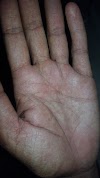Medical palmistry is a practice of studying the shape and size of the hands and
fingers to diagnose an individual's health and well-being. It is based on the
idea that the hand and fingers are connected to the body’s major organs and
systems. The practice of medical palmistry dates back thousands of years and is
still used today by many holistic healers to assess a person’s overall
health.The shape and size of the hand and fingers are believed to be connected
to the major organs in the body, such as the heart, lungs, and kidneys.
This is the hand of a Female Gym Instructor, having wonderful physic and had a good health.
For example, the thumb
is associated with the heart, and longer thumbs are associated with a healthy
heart. Similarly, the index finger is connected to the lungs and a longer index
finger is connected to healthier lungs. Longer middle fingers are associated
with healthier kidneys, while the pinky finger is associated with the
spleen.
The ring finger is associated with the digestive system and it’s believed that a longer ring finger indicates a healthier digestive system.
In medical palmistry, the size and shape of the lines and mounts on the palm can also provide additional insight into a person’s health.
This is the hand of a lady having very problems in heath life and she is mentally stressed as hand shapes tells us.
For example, the heart line is believed to be connected to the heart and a longer heart line typically indicates a healthy heart. The same is true for the other lines and mounts on the palm.
Medical palmistry is a fascinating practice and can provide a lot of insight into an individual’s health and well-being. By studying the shape and size of the fingers and the lines and mounts on the palm, a medical palmist can gain valuable insight into a person’s overall health and well-being. It’s important to keep in mind, however, that medical palmistry should not be used as a substitute for medical advice from a licensed physician.
Medical palmistry is the
study of the hands and fingers to determine the health of the body. It is
believed that the shape of the fingers and palms can reveal much about a
person’s physical and emotional health. A popular belief in medical palmistry
is that each finger has a direct connection to a specific organ, gland, or body
part. The thumb is believed to represent the heart, the index finger the lungs
and respiration, the middle finger the digestive system, the ring finger the
liver, and the little finger the kidneys.
The shape and size of the fingers can also be used to identify health issues in the body. For instance, a longer thumb can indicate a strong heart, while a shorter thumb may signify a weak one. Similarly, a longer index finger could suggest strong lungs, and a shorter index finger a weak respiratory system.
The size of the palm can
also be used to assess a person’s overall health. A bigger palm may indicate a
strong body, while a smaller palm may point to a weak body. The shape of the
palm is also important. A person with a curved palm may have poor circulation,
while a person with a square palm may have a strong immune system.
Medical palmistry is an
ancient practice that has been used for centuries to identify health issues in
the body. While it is not a substitute for medical diagnosis, it can be a
useful tool in helping to identify potential health problems. It is important
to remember that medical palmistry should not be used as a substitute for
traditional medical diagnosis, but rather as a supplement to it.

.jpeg)
.jpeg)


.jpeg)

.jpeg)

.jpeg)











1 Comments
please describe more
ReplyDeleteSend Your complete name & date of birth, on the social media links given below, we will reply there within 24 hours, Thanks